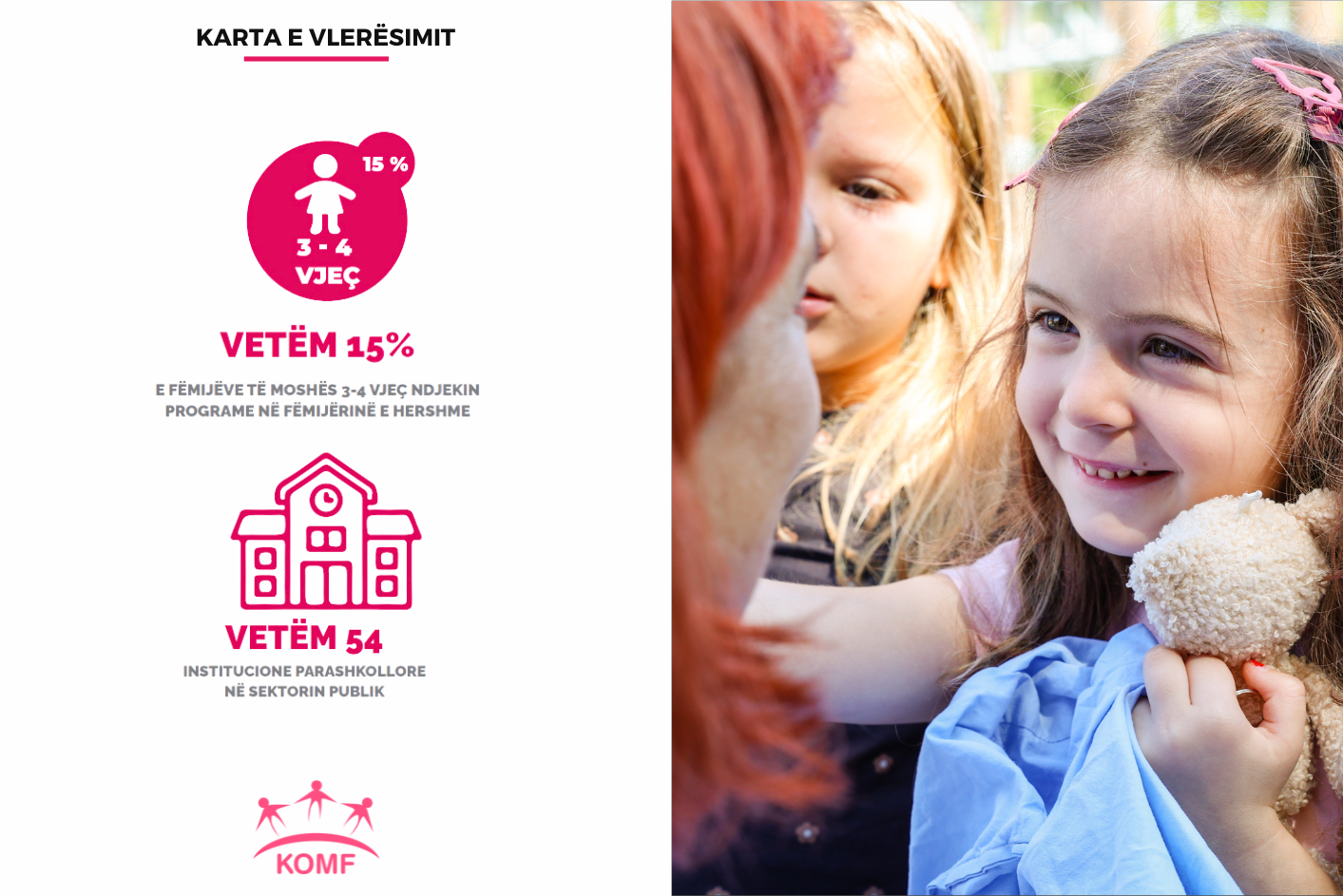
Earlychildhood development
Kosovo continues to remain the country with the lowest inclusion of children in preschool education, compared to countries in the region.
Only 15% of children aged 3-4 attend early childhood education programs, who usually are children living in wealthier households, meanwhile, the vast majority of children in the first years remain in home environment, mainly with their unemployed mothers as primary caregivers and without any support, outside of institutional settings. The main reason for such a low inclusion, is the insufficient capacity of preschool institutions and the general awareness of traditional forms of education within the family.
In Kosovo there are 54 preschool/kindergarten institutions, in the public sector.Preschool institutions are in the urban areas, while 10 municipalities do not have public preschool institutions. Rural areas are almost excluded from access to early childhood development services. 172 private preschool institutions in Kosovo are licensed by the Ministry of Education, Science, Technology and Innovation. Regarding private preschool institutions that work without license, their number is not known.
Children from marginalized groups, despite being exempt from payment, are often not included due to the limitation of the number of children. Out of 4,937 children in public preschool education, only 98 children belong to other nonmajority communities, and 4,839 are Albanians. From the general number of children in preschool education, 95.9% of children are Albanians and 4.1% are children from other ethnic groups.
Early childhood development services are not integrated in education, health and social welfare sectors. Services are isolated, unintegrated and uncoordinated – the family goes to various institutions to receive services. Services are mainly therapeutic and preventive services are inexistent.
An initiative towards intervention in early childhood through family services, is the systematic home visits model which is carried out by primary care health professionals within the Family Health Centers. This model would also be suitable for early childhood services to provide support for parents and caregivers.
Early childhood care and education is even more important for children with disabilities. Services for early identification and intervention are inexistent
In Kosovo, there is a lack of alternative programs to support parents and early intervention services in the family environment, lack of day care centers, learning centers, community centers, parent support groups, etc. It is necessary to develop programs for parents support, families and guardians in the child’s family environment, outside of the institutional environment.
There is a big number of private preschool institutions that operate without a license and the monitoring and inspection system almost lacks. Day care institutions include children of pre-primary age, however inspection is performed periodically only in kindergartens. Also, if kindergartens are registered as NGOs, they do not fall under the scope of the Inspectorate of the Ministry of Education, Science, Technology and Innovation.
Adoption of the Law on Early Childhood Education is a positive step. One of new approaches brought by this law is the establishment of a legal basis for inter-sectorial coordination and integration of services between education, health and social care services in early childhood. While, Despite the fact that the drafting process of the Early Childhood Education curricula has started a few years ago, it has not yet been approved.
Recomandations:
- Finalize and approve the Early Childhood Education curricula;
- Draft and approve the administrative instructions that derive from the Law on Early Childhood Education;
- Increase the number of preschool institutions and increase inclusion of children at the preschool level;
- Increase the inclusion of vulnerable children such as children with disabilities, children without parental care, children living in poverty, children from communities, etc., in preschool institutions;
- Prepare alternative early childhood development programs;
- Increase subsidies for Learning Centers that provide support to preschool;
- Conduct systematic home visits together with health and social workers for early identification, case management and support for parents and caregivers on early childhood development;
- Integrate early childhood development services among education, health and social protection sectors, according to the new Law on Early Education;
- Improve assessment and inspection quality of preschool services;
- Define the legal basis and standards regarding daycare for children of pre-primary school age which work separately or within private kindergartens;
- Liaise with the Department for Non-Governmental Organizations within the respective Ministry (Ministry of Local Government or Ministry of Internal Affairs) regarding cases where private kindergartens are registered as non-governmental organizations.

Recent Comments